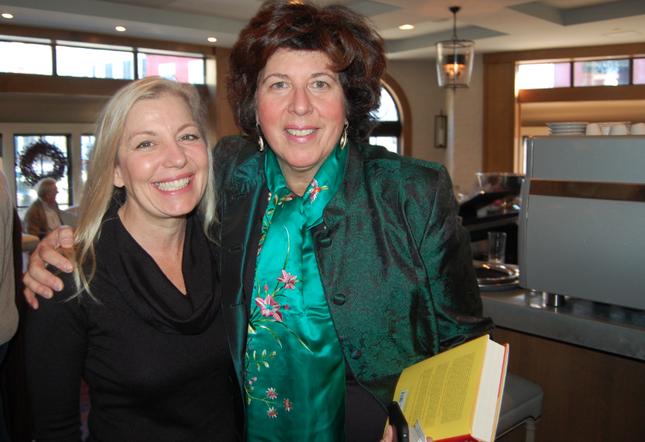Francesca Zambello: Opera’s Pied Piper
By • December 14, 2015 0 1397

If there’s ever a help wanted ad out there that reads, “Urgent, Pied Piper wanted,” they might want to have Francesca Zambello answer it.
Zambello, the Washington National Opera’s artistic director, showed up at The Georgetowner’s Cultural Leadership Breakfast at the George Town Club Dec. 3 and acted very much like the pied piper, not just for the WNO and its season, but for opera itself.
She took turns in the roles of carny barker, and an enthusiast and story-teller, all of it backed up by a lifetime of acclaimed work as a director, including film, and musical theater (“The Little Mermaid” on Broadway), a reputation for fearlessness, like an intrepid explorer going into unexplored territories, regaling the gathering with how a season at the WNO is put together and what issues are addressed.
She has done this before many times, of course, most recently as the artistic advisor to the San Francisco Opera, where she directed Wagner’s Ring Cycle, and also currently as Artistic and General Director of the Glimmerglass Festival in Cooperstown, New York, where she competes with nothing less than the Baseball Hall of Fame during the summer.
As always, her approach was down to earth, straightforward and stirring all at the same time.
“The thing about opera audiences is that they’re about people who want different things,” she said. “There’s the people who love the classics, who want to see ‘Carmen’ on the schedule just about every year. This is about the ABC’s of opera, you know, ‘Aida,’ ‘La Boheme’ and ‘Carmen.’ Truthfully, there’s only about ten operas in the repertoire that will be that popular, maybe even less.”
“Then, there’s the people who absolutely can’t abide seeing another ‘Carmen’ and want and need more modern pieces—like ‘Appomattox’ or the series of one-act operas we’ve done, just this week, for instance, in the Terrace Theater,” she continued. “There’s also the middle ground of not so popular, operas which haven’t been done that much or aren’t that familiar which are a harder sell. Then there’s the young audience, kids who look at a young people’s opera like ‘Hansel and Gretel’ and say I want to do that or I want to see that. We began with that opera as part of a program that includes a holiday opera every year.”
“My interests have always been in a combination of classical, contemporary, and American operas and music, and with that, also in using and giving opportunities to our emerging artists—we have 12 singers and two pianists,” she said. How has that worked out? Well, there’s Solomon Howard, who starred as both Martin Luther King Jr and Frederick Douglass in “Appomattox”, has prominent roles in the upcoming behemoth “Ring Cycle”, starred in a WNO short opera “Approaching Ali”, and worked in “The Magic Flute” and “Macbeth” at Glimmerglass this year. “He’s a true local success story,” she said. “Now, mind you, he’s very imposing, six foot six and much taller than Martin Luther King, Jr. But we’re not doing Ken Burns documentaries here. We’re asking people to imagine, to respond.
“I thought ‘Appomattox’ was risky, I really did. Sure, Philip Glass is probably the best known contemporary music composer in the world. But it was a radically different kind of opera, and, personally, I thought we were very successful with it. So, that’s sort of a personal pat on the back for me by me.”
“Everybody says you have to cultivate a young audience, and that’s true,” she said “Like everyone else in the performing arts, we’re competing for an audience who gets much of its entertainment for free from a pad or a phone, a screen. I understand reduced prices and discounts, because that works. But I remember people would show up for a dress rehearsal, and it’s free, and then they’d come up and complain about this and that. And I thought, ‘Go drop off the end of the world, why don’t you?’ ”
In full booster mode, Zambello talked about the upcoming one-act production of “Better Gods” about the last queen of Hawaii (directed by Ethan McSweeny) and about the upcoming production of Kurt Weill’s “Lost in the Stars” at the Eisenhower Theater, “first time in a long, time.”
And she talked about the Wagner’s “Ring Cycle,” four operas, 16 hours—“It’s like a drug, it’s like binge watching on television, it’s about life, it’s about the earth, gods and global warming. It’s about everything. It’s a little bit of a monumental undertaking, and I’ll tell you, it’s something you’ll probably never experience again in your lifetime. We’re starting rehearsals in February.”
Zambello will have experience going for her, having directed the cycle at San Francisco Opera. The Ring Cycle, aka “Der Ring des Nibelungen” by Richard Wagner, is comprised of “Das Rheingold,” “Die Walkurie,” “Sigfried” and “Gotterdammerung.” When it comes to talk of contemporary or classic, Wagner and the cycle are in a category all their own—there’s nothing to which the operas and their composers can be compared, except maybe eras of history itself.
Somebody—in fact, many people—have described Zambello as fearless for the projects she takes on, for her straight forward approach, for having a vision that she thinks she can fulfill every time out. It’s courage combined with honesty, but also a kind of reveling in the world where she’s now a leading national and international role player. She’s a gifted artist, for sure, but also more than a hand presser, a marketer for her work and for the WNO.
She embraces opera and all of its parts, its big tent that needs to bring in new works, but also respect its total body of works. It needs its “Carmen” and “A View from the Bridge.” It needs its altars to Verdi and Mozart and maybe a separate Bavarian castle for Wagner. Also, it needs its new voices, its new composers and writers—and an audience that’s rich in diversity.
For all of that, and much much more, Francesca Zambello is no less than opera’s pied piper.
- Georgetowner publisher Sonya Bernhardt and Francesca Zambello, the Washington National Opera’s artistic director. | Photo by Robert Devaney



